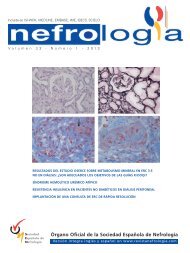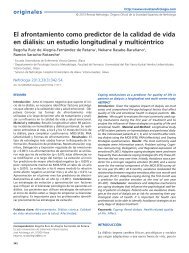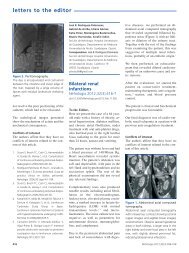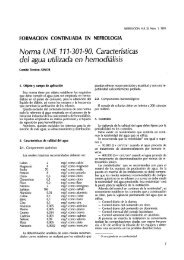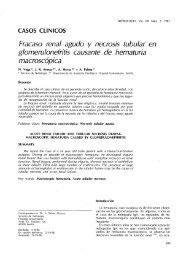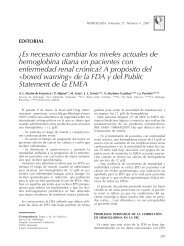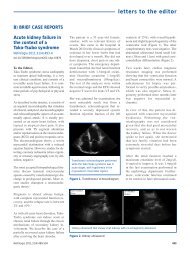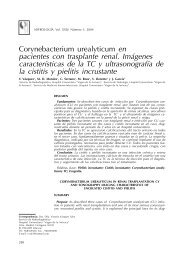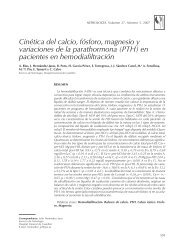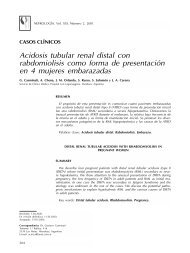PDF Número - NefrologÃa
PDF Número - NefrologÃa
PDF Número - NefrologÃa
Create successful ePaper yourself
Turn your PDF publications into a flip-book with our unique Google optimized e-Paper software.
http://www.revistanefrologia.com<br />
© 2011 Revista Nefrología. Órgano Oficial de la Sociedad Española de Nefrología<br />
originales breves<br />
Causas de inicio no programado del tratamiento renal<br />
sustitutivo con hemodiálisis<br />
A. Gomis Couto, J.L. Teruel Briones, M. Fernández Lucas, M. Rivera Gorrin,<br />
N. Rodríguez Mendiola, S. Jiménez Álvaro, C. Quereda Rodríguez-Navarro<br />
Servicio de Nefrología. Hospital Ramón y Cajal. Madrid<br />
Nefrologia 2011;31(6):733-7<br />
doi:10.3265/Nefrologia.pre2011.Sep.10927<br />
RESUMEN<br />
La mitad de los enfermos que comienzan tratamiento con hemodiálisis<br />
periódica lo hacen con un catéter venoso como acceso<br />
vascular (inicio no programado). Un objetivo del Grupo de<br />
Gestión de Calidad de la Sociedad Española de Nefrología es<br />
conseguir que el 80% de los enfermos comiencen la hemodiálisis<br />
a través de una fístula arteriovenosa. Hemos querido revisar<br />
las causas que condicionan en la actualidad el inicio no programado,<br />
para analizar cuáles pueden ser corregibles. En el<br />
año 2010, 43 enfermos comenzaron tratamiento con hemodiálisis<br />
periódica en el Hospital Ramón y Cajal de Madrid. La edad<br />
media fue de 61 años, el 79% eran hombres, la etiología más<br />
frecuente fue la diabetes mellitus (23%) y el índice de Charlson<br />
era de 6,3 ± 2,6. El inicio no programado de la hemodiálisis<br />
ocurrió en 20 enfermos (47%), sin objetivarse diferencias con<br />
los 23 enfermos que comenzaron hemodiálisis de forma programada,<br />
en ninguno de los diferentes parámetros clínicos o<br />
sociodemográficos analizados. La causa más frecuente de inicio<br />
no programado fue la reagudización de una enfermedad<br />
renal crónica en estadio 3 o 4, previamente estable, por un proceso<br />
intercurrente imprevisible (ocho enfermos, 40% de los casos).<br />
Un enfermo comenzó hemodiálisis periódica por un fracaso<br />
renal agudo no recuperado y en otros seis el motivo de<br />
inicio no programado no fue achacable al funcionamiento del<br />
sistema sanitario (enfermedad renal crónica no conocida en<br />
tres casos y causas achacables al propio enfermo en otros tres).<br />
Solamente en el 25% de todos los casos (cinco enfermos), la<br />
causa de inicio no programado pudo ser corregible. La mayoría<br />
de las causas de inicio no programado de hemodiálisis son<br />
ajenas a la organización sanitaria y, por tanto, difíciles de subsanar.<br />
Estas circunstancias deben tenerse en cuenta cuando se<br />
revisen los objetivos del Grupo de Gestión de Calidad.<br />
Palabras clave: Hemodiálisis. Inicio de diálisis. Acceso<br />
vascular.<br />
Causes of unscheduled haemodialysis initiation<br />
ABSTRACT<br />
Half of patients starting chronic hemodialysis used a transient<br />
vascular catheter as a vascular access (unplanned initiation).<br />
An objective of the Quality Management Group<br />
of the Spanish Society of Nephrology is to achieve that<br />
80% of the patients starting hemodialysis do it with an arteriovenous<br />
fistula. We want to review the causes of nonplanned<br />
hemodialysis nowadays. In 2010, 43 patients had<br />
started chronic hemodialysis in the Hospital Ramón y Cajal<br />
in Madrid (Spain). Mean age was 61 years, 79% were men,<br />
the most frequent cause of chronic renal disease was the<br />
diabetes (23%) and Charlson Comorbidity Index was 6.3 ±<br />
2.6. The unplanned hemodialysis occurred in 20 patients<br />
(47%), without any differences with the 23 patients who<br />
began planned hemodialysis, in none of the clinical or demographic<br />
parameters analyzed. The main cause of unplanned<br />
hemodialysis was the acute exacerbation of chronic<br />
kidney disease stage 3 or 4, previously stable, secondary<br />
to an unforeseeable intercurrent process (8 patients, 40%<br />
of the cases). One patient began after a non-recovery acute<br />
renal failure and in other 6 patients, the reason of unplanned<br />
hemodialysis initiation was not attributable to<br />
the operation Health System (in 3 cases unknown kidney<br />
chronic disease and in the other 3 cases it was patient´s responsibility).<br />
Only in 5 cases (25%), the cause could be corrigible.<br />
Most causes of unplanned hemodialysis does not come<br />
from the healthcare organization and therefore not easy to<br />
resolve it. Consequently, the objective of the Quality<br />
Group will be difficult to be achieved.<br />
Keywords: Haemodialysis. Dialysis initiation. Vascular access.<br />
Correspondencia: A. Gomis Couto<br />
Servicio de Nefrología.<br />
Hospital Ramón y Cajal. Madrid.<br />
agomis.hrc@salud.madrid.org<br />
INTRODUCCIÓN<br />
Los datos del Registro Catalán de Enfermos Renales y de un<br />
estudio multicéntrico español, recogidos ambos en los años<br />
1996 y 1997, coincidieron en poner de manifiesto que casi la<br />
733



